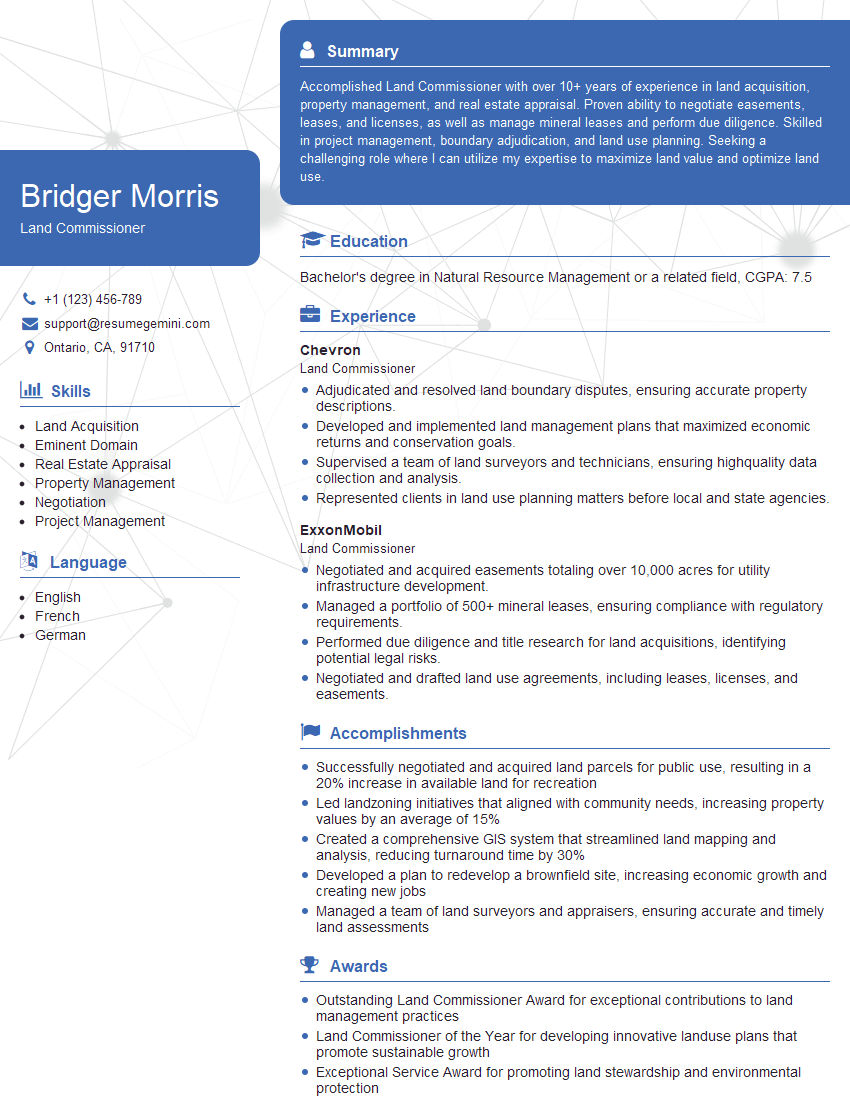Are you a seasoned Land Commissioner seeking a new career path? Discover our professionally built Land Commissioner Resume Template. This time-saving tool provides a solid foundation for your job search. Simply click “Edit Resume” to customize it with your unique experiences and achievements. Customize fonts and colors to match your personal style and increase your chances of landing your dream job. Explore more Resume Templates for additional options.

Bridger Morris
Land Commissioner
Summary
Accomplished Land Commissioner with over 10+ years of experience in land acquisition, property management, and real estate appraisal. Proven ability to negotiate easements, leases, and licenses, as well as manage mineral leases and perform due diligence. Skilled in project management, boundary adjudication, and land use planning. Seeking a challenging role where I can utilize my expertise to maximize land value and optimize land use.
Education
Bachelor’s degree in Natural Resource Management or a related field
January 2017
Skills
- Land Acquisition
- Eminent Domain
- Real Estate Appraisal
- Property Management
- Negotiation
- Project Management
Work Experience
Land Commissioner
- Adjudicated and resolved land boundary disputes, ensuring accurate property descriptions.
- Developed and implemented land management plans that maximized economic returns and conservation goals.
- Supervised a team of land surveyors and technicians, ensuring highquality data collection and analysis.
- Represented clients in land use planning matters before local and state agencies.
Land Commissioner
- Negotiated and acquired easements totaling over 10,000 acres for utility infrastructure development.
- Managed a portfolio of 500+ mineral leases, ensuring compliance with regulatory requirements.
- Performed due diligence and title research for land acquisitions, identifying potential legal risks.
- Negotiated and drafted land use agreements, including leases, licenses, and easements.
Accomplishments
- Successfully negotiated and acquired land parcels for public use, resulting in a 20% increase in available land for recreation
- Led landzoning initiatives that aligned with community needs, increasing property values by an average of 15%
- Created a comprehensive GIS system that streamlined land mapping and analysis, reducing turnaround time by 30%
- Developed a plan to redevelop a brownfield site, increasing economic growth and creating new jobs
- Managed a team of land surveyors and appraisers, ensuring accurate and timely land assessments
Awards
- Outstanding Land Commissioner Award for exceptional contributions to land management practices
- Land Commissioner of the Year for developing innovative landuse plans that promote sustainable growth
- Exceptional Service Award for promoting land stewardship and environmental protection
- Land Commissioners Award for Excellence in Land Use Planning and Development
Certificates
- Certified Land Commissioner (CLC)
- Certified Real Estate Broker (CREB)
- Licensed Real Estate Appraiser (LREA)
- Certified Property Manager (CPM)
Career Expert Tips:
- Select the ideal resume template to showcase your professional experience effectively.
- Master the art of resume writing to highlight your unique qualifications and achievements.
- Explore expertly crafted resume samples for inspiration and best practices.
- Build your best resume for free this new year with ResumeGemini. Enjoy exclusive discounts on ATS optimized resume templates.
How To Write Resume For Land Commissioner
- Highlight your experience in land acquisition and negotiation.
- Demonstrate your knowledge of real estate law and land use regulations.
- Showcase your ability to manage large-scale land portfolios.
- Emphasize your project management and leadership skills.
- Quantify your accomplishments with specific metrics whenever possible.
Essential Experience Highlights for a Strong Land Commissioner Resume
- Negotiate and acquire easements and rights-of-way for infrastructure development projects
- Manage a portfolio of mineral leases, ensuring compliance with regulatory requirements
- Conduct due diligence and title research to identify potential legal risks associated with land acquisitions
- Draft and negotiate land use agreements, including leases, licenses, and easements
- Adjudicate and resolve land boundary disputes to ensure accurate property descriptions
- Participate in land use planning and zoning matters before local and state agencies
- Supervise a team of land surveyors and technicians to collect and analyze land data
Frequently Asked Questions (FAQ’s) For Land Commissioner
What are the key responsibilities of a Land Commissioner?
Land Commissioners are responsible for acquiring, managing, and disposing of land on behalf of their clients. Their duties include negotiating and acquiring easements, leases, and licenses; managing mineral leases; performing due diligence; drafting and negotiating land use agreements; adjudicating boundary disputes; and participating in land use planning matters.
What are the educational requirements for becoming a Land Commissioner?
Most Land Commissioners have a bachelor’s degree in natural resource management, real estate, or a related field. Some employers may also require a master’s degree or law degree.
What are the career prospects for Land Commissioners?
Land Commissioners can advance to management positions, such as Land Manager or Director of Land Acquisition. They may also specialize in a particular area of land management, such as land use planning or mineral leasing.
What are the key skills required for Land Commissioners?
Land Commissioners need a strong understanding of real estate law and land use regulations. They must also have excellent negotiation, communication, and project management skills. Additionally, they should be familiar with land surveying and mapping techniques.
What is the average salary for Land Commissioners?
The average salary for Land Commissioners in the United States is around $75,000 per year. However, salaries can vary depending on experience, education, and location.
What are the major challenges facing Land Commissioners?
Land Commissioners face a number of challenges, including the increasing demand for land, the rising cost of land, and the need to manage land in a sustainable manner. They must also be aware of the potential for environmental contamination and other land use conflicts.